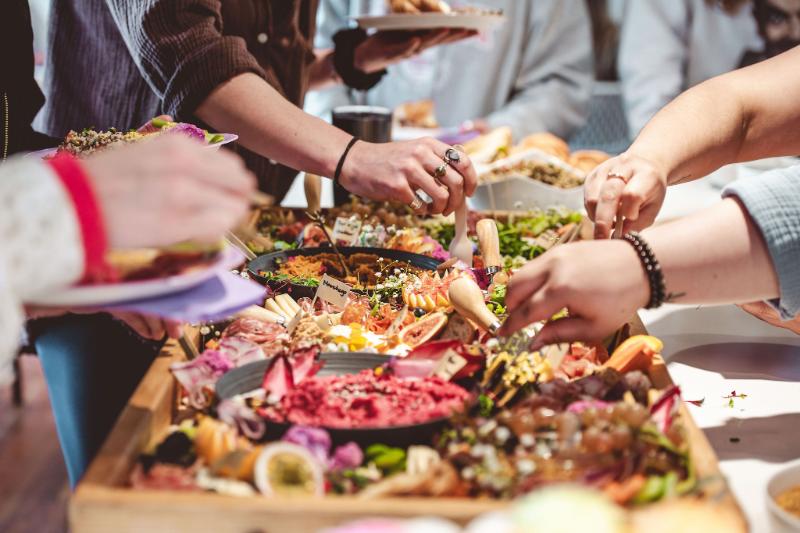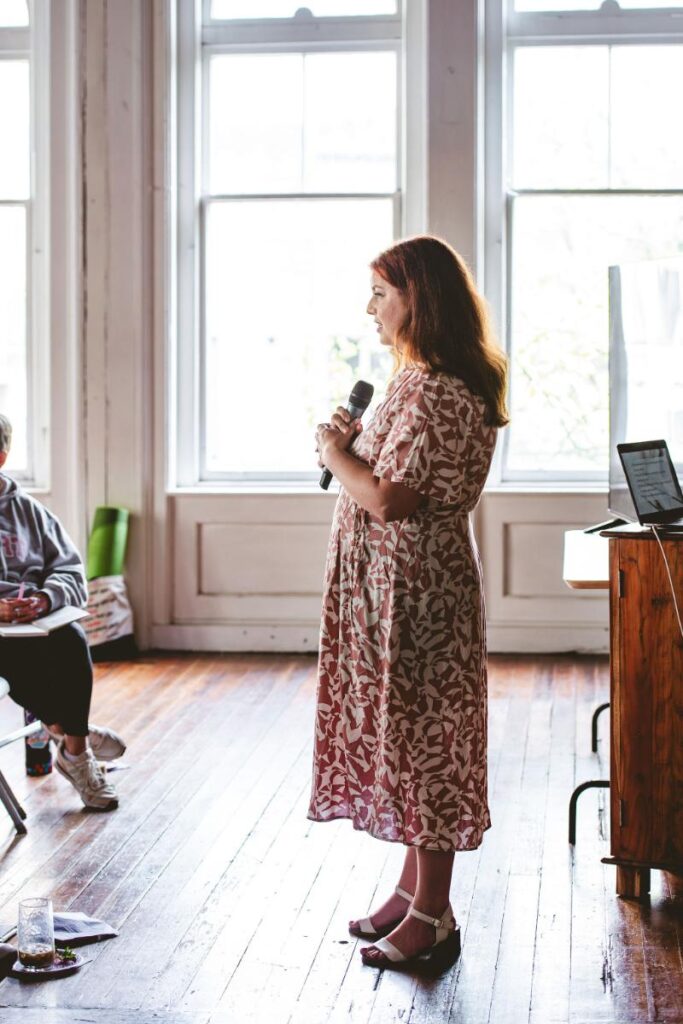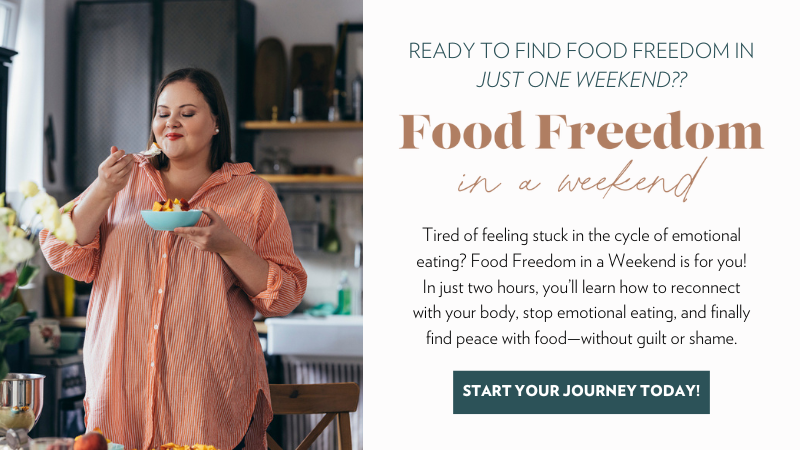If you’ve ever thought, “I know better, but I still can’t figure out how to stop overeating,” you’re not alone. Many women I work with have read the intuitive eating books, followed the Instagram accounts, and even worked with professionals, yet they still feel out of control with food. It’s not because you’re weak or broken. It’s because there’s a big difference between knowing the information and actually feeling safe enough to put it into practice.
Awareness of the problem is important, but awareness alone doesn’t rebuild trust with your body. That’s why so many women feel stuck in the binge–restrict cycle or end up blaming themselves when old patterns return. True change comes when you move from intellectual understanding into lived experience, what I call embodiment.
In this article, you’ll learn why diets don’t work, what’s really happening in your body when overeating takes over, and the first compassionate steps toward rebuilding trust with food, without falling back into restriction.

Hi, I’m Dr. Meredith MacKenzie – binge eating therapist, and founder of the One Body to Love program. Over the years, I’ve worked with countless women who feel stuck in the frustrating cycle of overeating, guilt, and “starting over” on Monday. Many of them already know about intuitive eating, but still wonder why they can’t stop turning to food at night or why their cravings feel so powerful.

My role is to help bridge that gap between knowing what to do and actually feeling safe enough to do it. Through compassionate, evidence-based strategies, I support women in building trust with their bodies and breaking free from the patterns that dieting created. If you’re looking for a gentler, more sustainable path to food freedom, you’re in the right place. For ongoing support and everyday conversations about food freedom, intuitive eating, and body trust, join me on Instagram at @dr.meredithmackenzie
Why Diets Don’t Work Long Term
If diets really worked, you wouldn’t still be searching for how to stop overeating. But research shows the opposite: dieting not only fails to provide lasting results, it often makes the problem worse.
Studies demonstrate that dieting triggers powerful biological and psychological responses that lead to weight cycling and overeating. For example, research has shown how the body’s survival mechanisms kick in after restriction, driving intense hunger and overeating that often overshoots baseline weight (read the study here).
Other reviews highlight that most weight loss programs have high dropout rates, minimal results, and nearly universal weight regain within one to five years (see this article). Even when participants lose 5–10% of their weight, most regain it quickly, leaving them trapped in a cycle of guilt and renewed dieting attempts.
This is why diets don’t work: they ignore your body’s wisdom, increase shame, and set you up to feel out of control with food. Instead of learning how to stop overeating, diets keep you locked in the binge–restrict loop.
The next step isn’t about more discipline or stricter rules. It’s about learning to work with your body, rebuilding trust, and finding sustainable ways to meet your needs.
The Real Reason You Can’t Stop Overeating

When women tell me they “lost control,” I remind them that overeating is not a personal flaw, it’s a response. Most of my clients are running on fumes: balancing demanding jobs, caring for family, and trying to “eat clean” on as little fuel as possible.
Skipping meals, relying on salads or low-calorie snacks, or constantly worrying about eating “too much” leaves your body undernourished. By the end of the day, your brain is in survival mode. Overeating is not a failure of willpower, it’s your body doing its job to keep you alive.
If you’re wondering how to stop overeating, the first step is shifting the blame away from yourself. It’s starts with recognizing that your body needs enough food, consistently, to function well.
For more support and to better understand your eating patterns, learn more about my approach here.
How Restriction Backfires
When things feel out of control, most people’s instinct is to restrict harder: cutting sugar, counting portions, or vowing to “start fresh” on Monday. But restriction (both physical and mental) is the very thing that keeps you stuck.
Even if you allow yourself a treat, if it’s accompanied by guilt or strict limits, your body still senses deprivation. Research shows that this deprivation leads to stronger cravings and eventual overeating (see this review of dieting outcomes).
This is why diets don’t work long term. They teach you to override your hunger signals, which eventually leads to bingeing and shame. If you want to know how to stop overeating, the solution isn’t more rules, it’s building safety and consistency with food.
This is why diets don’t work long term. They teach you to override your hunger signals, which eventually leads to bingeing and shame. If you want to know how to stop overeating, the solution isn’t more rules—it’s building safety and consistency with food. For more on navigating those difficult feelings, read my article on breaking the shame cycle after emotional eating.
For a simple way to start noticing what your body is really asking for, try my free flowchart on telling the difference between physical and emotional hunger.

The Science Behind Overeating
Here’s what happens biologically when you go too long without enough food:
- Your stomach empties → blood sugar drops.
- Your gut releases hunger hormones (ghrelin).
- Your brain pumps out neuropeptide Y → powerful cravings for high-energy foods.
- Stress hormones rise → making food feel urgent and irresistible.
This is your body creating “biological urgency.” It’s not about willpower—it’s survival. Research on metabolic regulation shows that restriction suppresses your metabolism and fuels overeating once food is available again (see Dulloo’s work here).
When you understand this, you can see why stopping overeating isn’t about trying harder, it’s about nourishing your body consistently so it doesn’t have to sound the alarm.

How to Stop Overeating by Building Trust With Your Body
So what actually works? Learning to rebuild trust and safety with food. That means:
- Eating enough throughout the day, not just when you’ve “earned it.”
- Letting go of guilt and food rules.
- Pausing to notice if you’re hungry, tired, or emotionally depleted.
- Allowing satisfaction (not just nutrition) to guide meals.
When you shift from control to connection, overeating loses its urgency. You begin to feel calm with food, notice hunger earlier, and actually enjoy what you eat.
This is the foundation of my One Body to Love program. It’s not about perfect discipline, it’s about creating safety so your body no longer has to fight for nourishment. For a self-paced way to begin, explore my Food Freedom in a Weekend course.

Beyond Biology: The Emotional Weight You’re Carrying
Up to this point, we’ve focused on the biological and behavioral reasons why diets don’t work and why your body pushes you toward food when it feels deprived. But biology isn’t the only factor that drives overeating.
For so many women I work with, it’s not just about hunger or willpower, it’s about the emotional labor they carry every single day. Holding everything together at work, at home, and in relationships takes a toll. And when your body finally has a chance to stop, food often becomes the release valve.
If you’ve ever wondered why you can eat “perfectly” all day but lose control at night, this deeper layer might resonate. I explore this further in an article on how emotional labor, people-pleasing, and caregiving show up in women’s eating patterns and why food can become the one place you finally feel allowed to let go.
Grab my free flowchart to tell the difference between physical and emotional hunger for a practical tool you can start using today.

Final Thoughts: You Don’t Have to Do This Alone
If you’re ready to stop overeating but feel trapped in the same cycle, you don’t have to figure it out by yourself. Inside my One Body to Love program, I help women move from awareness into embodiment—slowing down, reconnecting, and finding safety with food again.
If you’d like to explore what this could look like for you, I invite you to book a free connection call with me. Together, we’ll talk through your struggles, identify your next steps, and see if One Body to Love is the right fit.
You’ve spent enough time in the binge–restrict loop. Now it’s time to build trust, compassion, and food freedom that lasts.